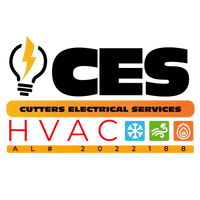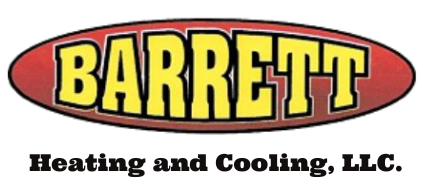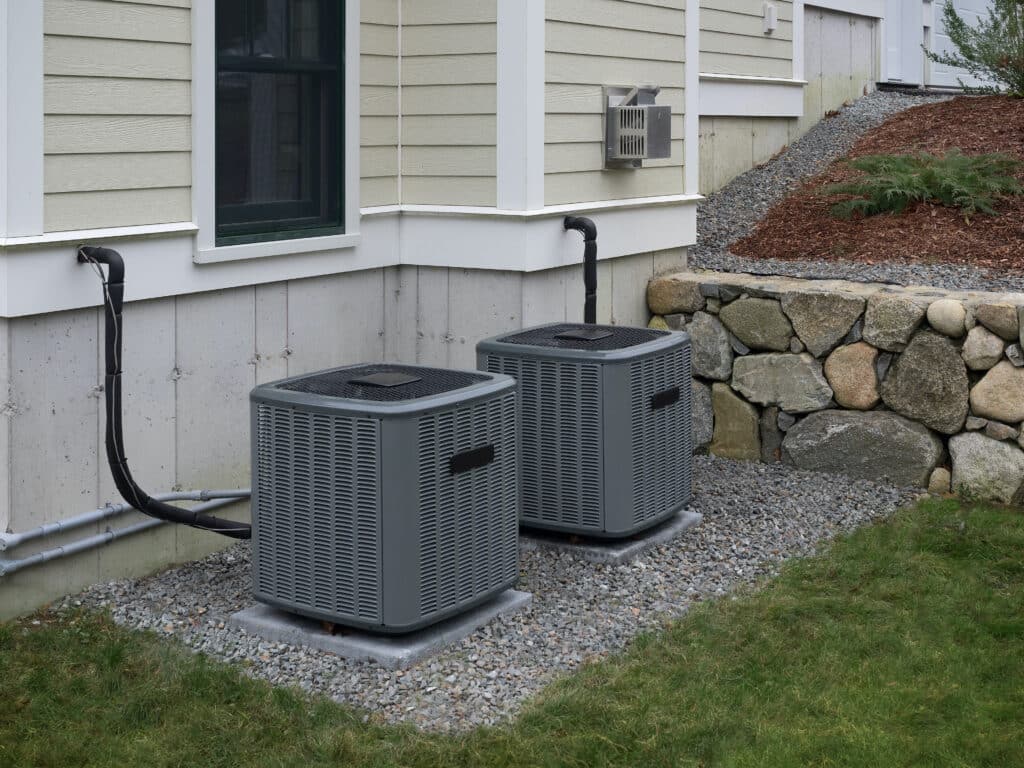Common Types of Air Conditioners
HVAC technicians have the expertise to service most air conditioner types, but knowing more about what you have can be beneficial. Below, we'll describe each of the common AC types.
- Split ACs: Split air conditioners have two main elements: one inside and one outside. They offer peaceful operation, greater energy efficiency, ductwork options, and more cooling capability versus mini-splits.
- Ductless mini-split: Ductless mini-split AC units have an outdoor unit and multiple interior units, with no ductwork required. They offer individual room temperature control, flexible installation options, and higher energy efficiency.
- Window ACs: Window air conditioners are a popular choice for Montgomery condos, apartments, and townhomes. These compact, affordable units are designed for cooling small spaces and single rooms, and they fit snugly in a window frame or dedicated wall slot. Many window AC users install their units without professional assistance, though technicians can still help with maintenance and repairs.
- Portable air conditioners: As the name suggests, portable air conditioner systems don't require permanent installation or ductwork. Instead, they remove hot air through an exhaust hose connected to a window or nearby vent. They're preferred for condos, apartments, or individual rooms.
- Central AC: These are the most common home air conditioners, offering precise, consistent temperature control. They feature a central unit that cools air from outside, purifies it, and sends it through ducts to different rooms in your home.
How to Choose Your Montgomery AC Repair Service
With the oppressive Montgomery heat, AC issues are urgent to fix. However, to get the best possible outcome, it's critical to investigate different HVAC companies first. We recommend adhering to these steps as you prepare.
Confirm the Company Is Properly Licensed and Insured
Alabama has a dedicated Board of Heating, Air Conditioning, & Refrigeration Contractors that issues licenses and enforces regulations. To get a heating/air conditioning or refrigeration contractor license, a businessowner must pass an exam, pay an annual fee, register their company, and get at least a $15,000 performance bond. The state has a license reciprocity agreement with Louisiana, Mississippi, Tennessee, South Carolina, and West Virginia, but each businessowner must take four hours of continuing education in Alabama per year to stay in active standing.
You should also check a company has sufficient liability insurance coverage, even if your state doesn't require it. Choosing an insured company will protect you if something gets damaged during work.
Read Customer Reviews
Read customer reviews on the Better Business Bureau (BBB) website for each company you're interested in. The BBB recognizes contractors that respond to complaints effectively and honor their warranties.
It's normal for even the best AC repair companies to have both positive and negative reviews. Read each one carefully, and avoid a company if most reviewers had subpar experiences.
Compare Estimates
Obtain at least three detailed, written estimates from different providers for the best price. A good estimate should factor in additional fees such as permitting costs. You should also ask about the emergency repair process, manufacturer warranties, and installer guarantees.
Ready to Get a Quote on Your Hvac Project?
Please enter a valid 5-digit zip code!
Frequently Asked Questions About AC Repair in Montgomery
How much can I expect to pay for AC repair in Montgomery?
See the average costs for common AC repairs below.
| Common Repair | Average Cost |
|---|---|
| Clogged air filter | $61–$162 |
| Electrical circuits | $200–$250 |
| Drainage problems | $100–$150 |
| Thermostat | $81–$203 |
| Refrigerant leak | $400–$1500 |
| Frozen condenser coils | $1,218–$3,655 |
| Fan or air blower issues | $150–$200 |
| Compressor replacement | $600–$1,543 |
When is the best time to replace an AC unit?
What do I do if my AC is running but not cooling?
Should my HVAC company have a private accreditation?
How quickly can an HVAC company in Montgomery respond to emergency repair requests?
To share feedback or ask a question about this article, send a note to our Reviews Team at reviewsteam@thisoldhousereviews.com.
















